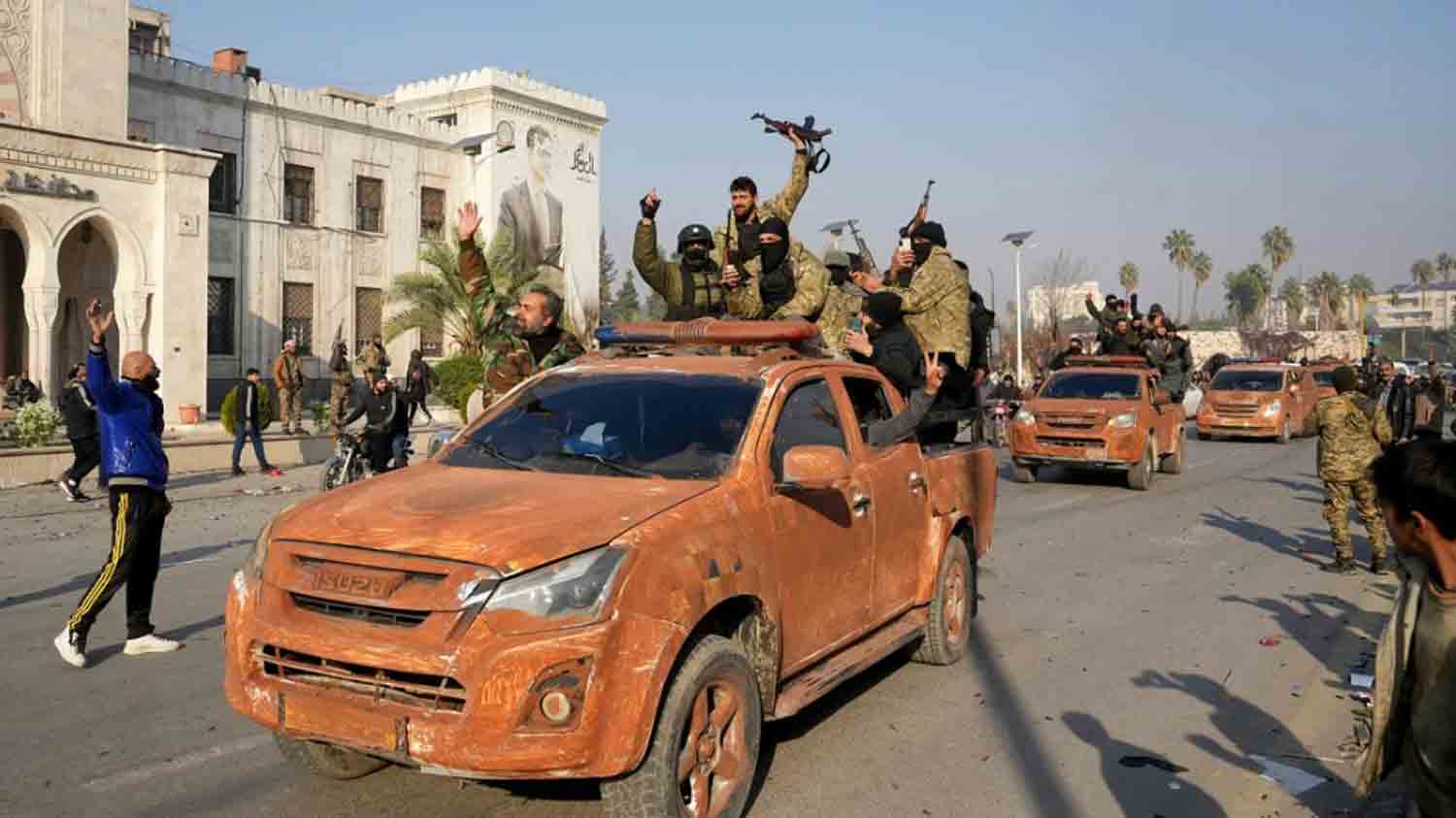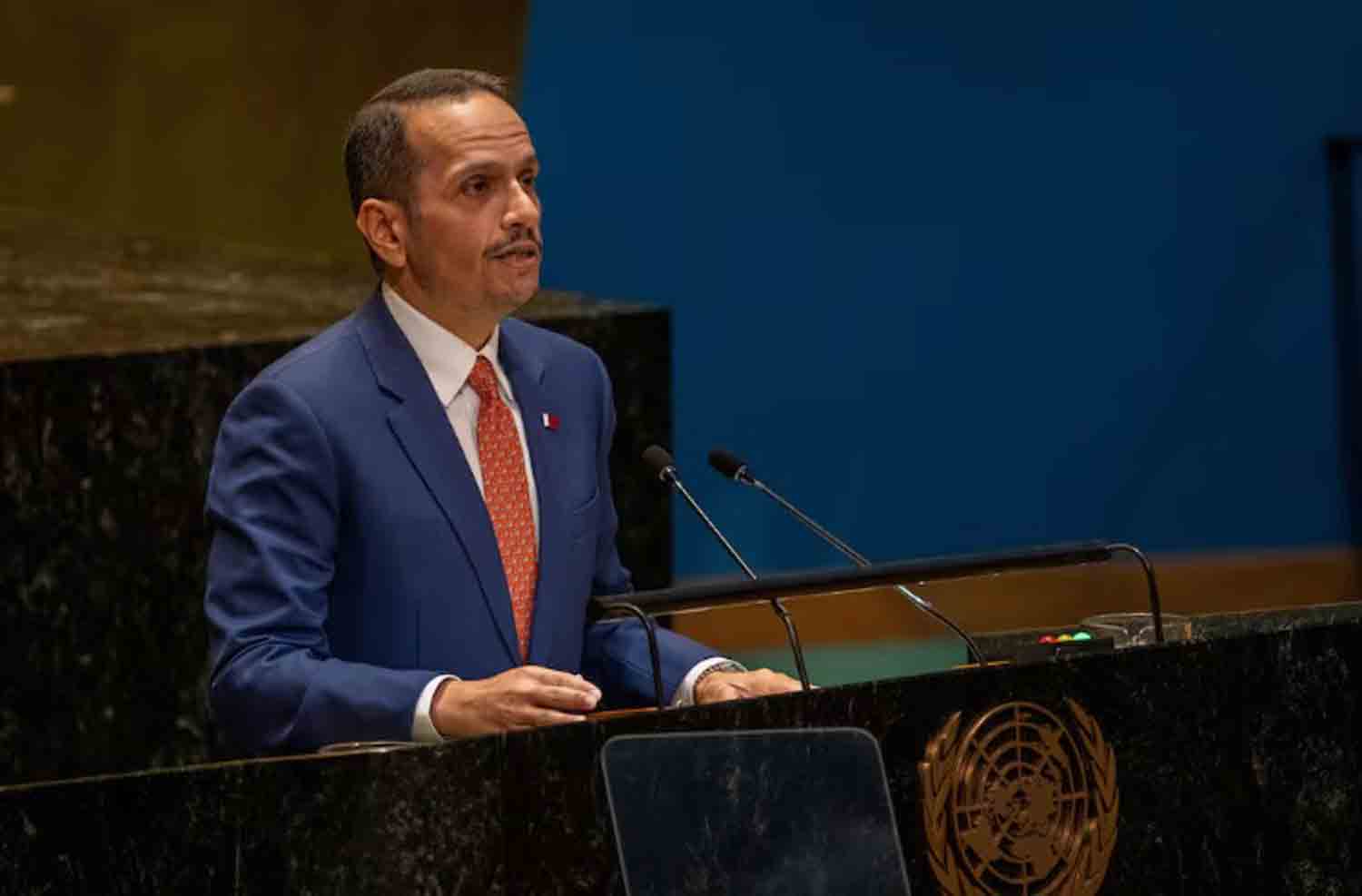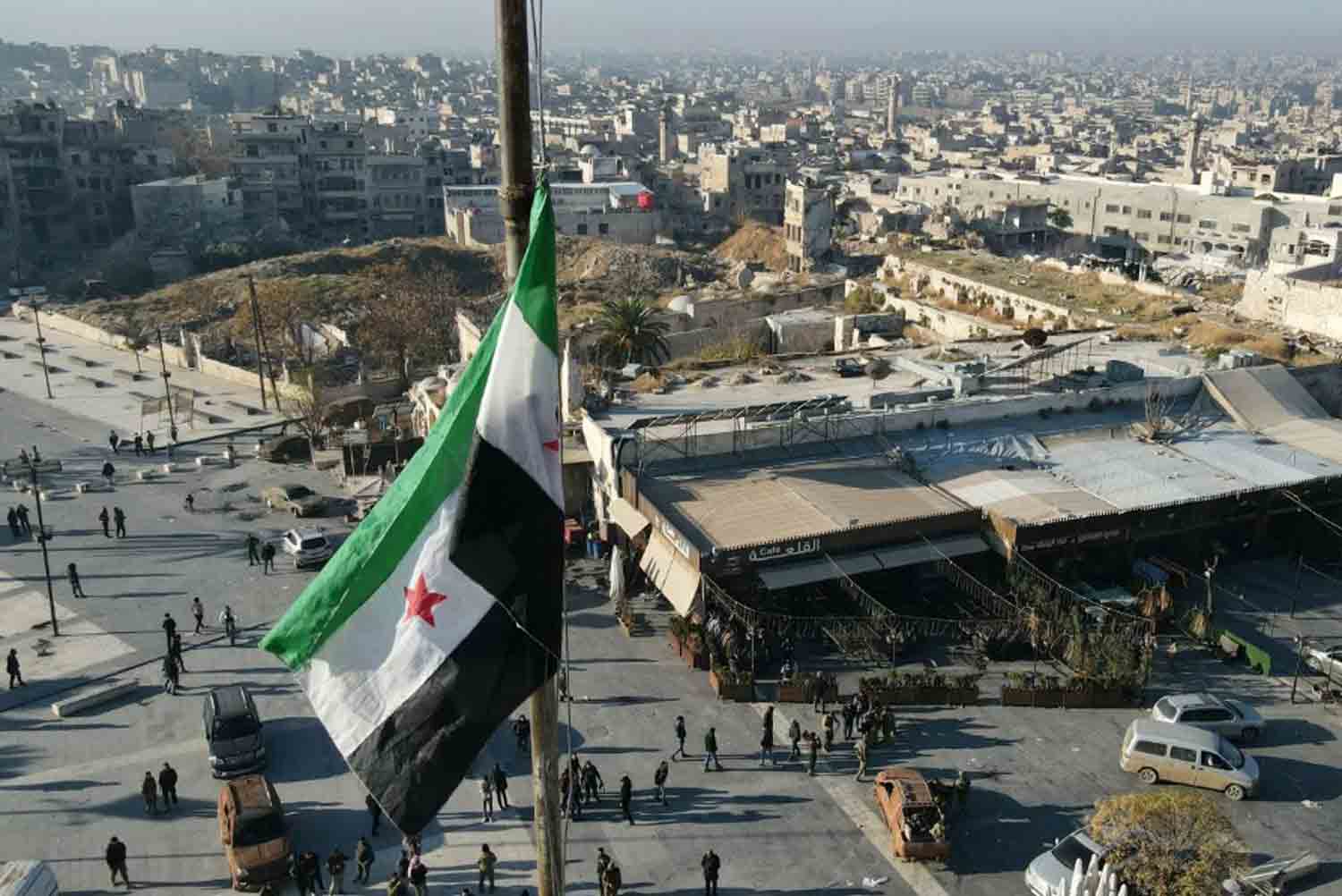Global stakeholders are now faced with the geopolitical ramifications of a rebel offensive spearheaded by an Islamist faction in Syria, which poses a potential threat to President Bashar al-Assad’s grip on power.
Syrian rebels have rapidly advanced in the northern region, capturing two significant cities: Aleppo, the nation’s second-largest city, and Hama, a city of strategic importance located along a crucial supply route. The rebels have indicated their intention to push further south towards Homs, which is situated just over 100 miles from the capital, Damascus.
Abu Mohammad al-Jolani, a former Al Qaeda operative now leading the rebellion, stated in a CNN interview on Thursday, “When we discuss our objectives, the ultimate aim of the revolution is to dismantle this regime. We have the right to employ all means necessary to achieve that aim.”
Although Assad faces numerous adversaries both regionally and internationally, his removal may not be universally welcomed.
Western nations, Arab states, and Israel are keen to diminish Iran’s influence in Syria; however, they are not in favor of a radical Islamist regime succeeding Assad. For Russia, the fall of Syria could result in the loss of its closest ally in the Middle East, jeopardizing its capacity to exert influence while engaged in the conflict in Ukraine. For Iran, it could disrupt its so-called Axis of Resistance, which includes allied nations and militias.
The developments in Syria could have significant implications for key players in the Middle East:
Arab states
The advances made by rebels in Syria represent a critical test of the commitment of influential Arab states to reconcile with Assad.
During the peak of the Syrian civil war, Sunni Arab nations, including major players like Saudi Arabia and the United Arab Emirates, severed ties with the Iran-aligned Assad regime, sought to isolate it, and supported opposition factions aiming to overthrow it, viewing this as an opportunity to limit Tehran’s regional dominance.
Assad, supported by Russia, Iran, and Hezbollah from Lebanon, managed to endure and regain territories previously lost to rebel forces. Amid stringent U.S. sanctions, Syria has been described by some analysts as a “narco-state,” contributing to a drug crisis in surrounding nations.
This new situation in Syria has led Arab countries to reach out to the Assad regime, with Saudi Arabia and the UAE taking the lead in efforts to reintegrate him into the regional and international community. In 2023, the Syrian government was readmitted to the Arab League.
More than ten years after initially supporting the Syrian opposition, Gulf Arab states, including Saudi Arabia and the UAE, are now aligning with Assad as he confronts renewed rebellion.
“In 2011, many nations quickly concluded that they would be better off with Assad’s removal… however, the Saudis, Emiratis, and other regional players now perceive his potential fall as a destabilizing threat,” stated Trita Parsi, executive vice president of the Quincy Institute in Washington, D.C.
During their recent Gulf Cooperation Council (GCC) summit, Gulf Arab leaders emphasized the importance of maintaining Syria’s territorial integrity, affirmed respect for its sovereignty, and opposed any external interference in its domestic matters. In stark contrast, the statement from the 2011 GCC summit urged Assad to “immediately halt the violence, end the bloodshed, and release prisoners.”
Many of these nations may seek to leverage the current circumstances to enhance their standing within Syria, especially in relation to Iran. However, this requires a scenario where Assad is diminished yet remains in power, which contrasts sharply with their previous stance of attempting to oust him entirely, according to Parsi.
Iran
Iran has utilized Syria as a means to bolster its influence in the region through various proxy groups based there. The Islamic Republic, along with its key ally Hezbollah, has played a crucial role in supporting Assad’s regime by assisting Syrian forces in reclaiming lost territories and deploying commanders from the Islamic Revolutionary Guard Corps (IRGC) to provide military guidance.
Following the attack by the Palestinian militant group Hamas on Israel in October of the previous year, Hezbollah engaged in skirmishes with Israeli forces, leading to retaliatory strikes that resulted in the assassination of key Hezbollah leaders and a significant reduction in the group’s operational capabilities. Consequently, Hezbollah withdrew its forces from Syria to concentrate on its conflict with Israel, leaving Assad vulnerable, according to experts.
In its operations, Israel has persistently targeted Iranian personnel and the supply lines used for transferring arms to its proxies. The capture of Aleppo and potentially other cities near the Lebanese border could further disrupt these supply routes, placing Iran in a precarious situation. Recently, Iranian Foreign Minister Abbas Araghchi indicated to the Qatari news outlet Al Araby Al Jadeed that Tehran would contemplate deploying troops to Syria if requested by the Assad government. However, intensifying the conflict in Syria could jeopardize Iran’s diplomatic efforts with Western and Arab nations.
Losing Syria would represent a significant setback for Iran, according to Parsi. He emphasized the substantial investments made by Iran in Syria, highlighting its role as a crucial land corridor to Lebanon. Additionally, the longstanding alliance between Iran and the Assad regime has been a defining feature throughout the history of the Islamic Republic.
Parsi also noted that Iran might leverage its regional proxies in potential negotiations with the incoming Trump administration.
He raised a critical question: “If Iran loses too much influence in the region, will it become too weak to engage in negotiations? Conversely, if they attempt to maintain their position through resistance, could they escalate the conflict to a level where diplomatic solutions become unattainable?” He remarked that Iran is navigating a precarious situation.
Israel
Israel finds itself in a challenging predicament as well. Although Assad regards Israel as an adversary, he has not directly threatened the nation, choosing instead to refrain from retaliating against the frequent Israeli airstrikes in Syria over the past year. However, Assad’s regime has permitted Iranian operations within its borders to support Hezbollah in Lebanon.
Hadi al-Bahra, a leader of the Syrian opposition representing anti-Assad factions, including the Turkey-backed Syrian National Army (SNA), indicated that recent Israeli actions against Hezbollah have emboldened rebels to advance towards Aleppo.
Al Bahra informed Reuters in an interview that the ongoing Lebanese conflict and the reduction of Hezbollah’s forces have resulted in diminished support for Assad’s regime. He noted that Iran-backed militias are also experiencing a decline in resources, while Russia is offering less aerial support to Assad’s forces due to its challenges related to Ukraine.
The primary faction leading the rebellion is Hayat Tahrir Al Sham (HTS), whose leader, Abu Muhammad Al Jolani, has a background as a former al Qaeda fighter and adheres to an Islamist ideology that is antagonistic towards Israel.
Avi Melamed, a former Israeli intelligence official, stated to CNN that Israel finds itself caught between Iran, its proxies, and the Islamic rebels in Syria. He remarked that while none of the options are favorable for Israel, the current weakening of Iran and its affiliates is a positive development.
Melamed emphasized the importance for Israel to ensure that the offensive does not escalate into a new threat from HTS and the Sunni rebels spearheading the assault in Syria.
Russia
Assad faced significant setbacks in Syria until the intervention of Russian President Vladimir Putin in 2015. The absence of Russian air support would have made the recapture of Aleppo in 2016, a pivotal moment for Assad, exceedingly challenging, if not unfeasible.
This week, the Kremlin reaffirmed its commitment to support Assad, as Russian aircraft intensified their strikes against opposition forces in northern Syria.
Nicole Grajewski, a fellow in the Nuclear Policy Program at the Carnegie Endowment for International Peace specializing in Russia, noted that the Assad regime was taken by surprise during the recent offensive by rebels. She suggested that the rebels might have exploited Russia’s preoccupation with Ukraine to gain territory in Syria.
While Moscow has not deployed a significant number of forces to Syria, Grajewski indicated that it could still provide support. However, she emphasized that Russia’s capacity to mobilize troops would be challenged by the rapid advances of the rebels in northern Syria.
Turkey
Grajewski described the rebels’ progress, aided by Turkey, as a considerable threat to Russia. She remarked, “Russia has invested heavily in Assad, and losing Syria would represent a significant blow to its status as a great power and its influence in the Middle East.”
Turkey has sought to distance itself from the actions of the rebels in northern Syria, yet it remains the main supporter of the Syrian National Army, one of the factions leading the offensive.
Ankara has also acted as a representative for the opposition in negotiations with Russia over the past decade, culminating in a ceasefire agreement in 2020 involving the various parties in Syria that each side supports.
Despite backing opposition forces, Turkey has not dismissed the possibility of improving relations with Syria. President Recep Tayyip Erdogan has expressed a desire to meet with Assad, whom he previously labeled a terrorist, in an effort to reset diplomatic ties. However, Assad has declined to engage in talks as long as Turkey maintains its military presence in parts of Syria.
Turkey is actively seeking a resolution for the approximately 3.1 million Syrian refugees it accommodates, the highest number of any nation. This situation has become a significant source of tension within Turkey, often resulting in anti-Syrian protests and demands for mass deportations from opposition factions.
Previously, the prevailing view in Turkey regarding the Syrian conflict was that the regime was gaining strength while the opposition was faltering, with developments largely influenced by the Iran-Russia alliance, according to Galip Dalay, a senior consulting fellow at Chatham House in London. However, recent advances by rebel forces have altered this power balance.
Dalay noted to CNN that there is now a clear desire among Turks to engage in negotiations, aiming to demonstrate to Assad that he is entering discussions from a position of vulnerability. He emphasized that for any negotiations to yield meaningful results, Assad must offer substantial concessions rather than superficial ones.
Additionally, Turkey aims to counter Kurdish militant groups situated along its border with Syria and establish a buffer zone. President Erdogan has consistently opposed Kurdish nationalism, making it evident that his primary objective is to dismantle the Kurdistan Workers’ Party (PKK), a militant and political organization that has been in conflict with the Turkish state for over thirty years.
Discover more from Defence Talks | Defense News Hub, Military Updates, Security Insights
Subscribe to get the latest posts sent to your email.





